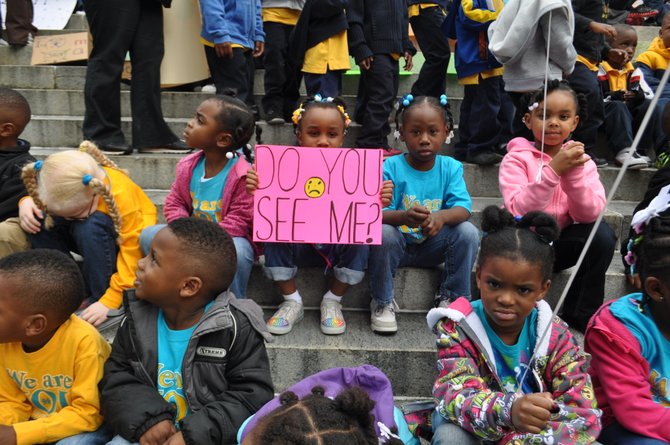Child-care center providers rallied against a new state program that forces some low-income parents to use finger scanners. Photo by Trip Burns.
The Mississippi attorney general's office has intervened on behalf of child-care providers who say they've been receiving harassing phone calls from Xerox, the mega-company that has the agreement to run the state's childcare payment and tracking system, a story the Jackson Free Press broke recently.
Responding to complaints from providers, Assistant Attorney General Early Scales ordered Xerox to halt communications with child-care centers scheduled to start participating in a controversial biometric finger-scanning program in November.
Since the Department of Human Services launched a pilot program in September requiring recipients of low-income child-care vouchers to scan their finger when dropping off or picking up a child, child-care operators have lodged numerous complaints.
Currently, 20 centers in Hinds, Rankin and Madison counties are participating in a pilot program to give the machines a trial run before they're rolled out in more centers around the state.
Xerox sent a letter to child-care providers in late July announcing the new child-care time and attendance program. The letter states that the new program requires the installation of new equipment, which comes at no cost to the provider. Also included in the 15-page packet were a provider agreement, a federal W-9 request for taxpayer-identification number form and a settlement authorization form.
Several operators testified that Xerox representatives have repeatedly called in recent weeks, telling providers they must sign and return the contract or they wouldn't continue getting paid. Earlier in the day, providers held a rally at the capitol to reject the Xerox contracts with chants of "Ban the Scan."
Jill Dent, director of DHS' Office for Children and Youth, ran the meeting. Dent did not answer questions or engage directly with speakers, but did address what she characterized as misconceptions about the program.
Dent explained that the Xerox machines do not capture fingerprints, but rather convert the finger images into a unique code that is associated with the parent or guardian's Social Security number. She also clarified that changes to the provider payment system would not result from the introduction of the scanners.
Dent told the Jackson Free Press recently that DHS is introducing new technology in phases that will help pare down the list of more than 8,000 children waiting for subsidy assistance. However, providers questioned Dent why the agency did not spend the $1.6 million used to purchase scanners to take kids off the waiting list.
Furthermore, providers called the scanners excessive government regulation. In addition to added costs of dedicating staff to oversee the machines, providers says the machines are full of glitches and discriminate about poor parents who receive child-care assistance. Parents who do not receive the subsidy are not required to scan in and out.
Also, because Xerox requires providers to have a dedicated land line for the hardware and submit voided checks in order to be reimbursed, providers also believe the program discriminates against some child-care center operators as well.
Jane Boykin, with Delta Licensed Providers, noted at a public hearing held yesterday at Mississippi Public Broadcasting auditorium in Jackson that many providers are African American and lack bank accounts.
"That is totally discriminatory on its face and in practice," Boykin said of the requirements.
Read more:


